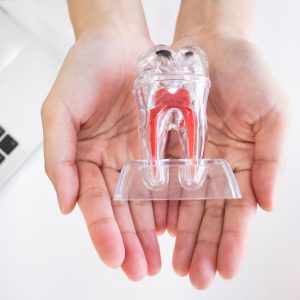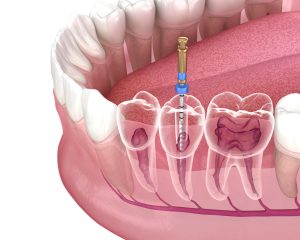Root Canals: Saving Your Teeth From Extraction
Your teeth are vital to daily tasks such as eating, speaking, and smiling. These necessary instruments, while strong, aren’t indestructible. When damage to your enamel endangers your teeth, root canal therapy may be advised.
At Gulf Gate Dental, our talented Sarasota dentists, Dr. Michael and Collin Ryan, as well as our dental team, know many patients may cringe in horror at the thought of undergoing root canal treatment. Rest assured, we’re equipped to gently and efficiently perform this treatment, which may help save your tooth from extraction. Learn how root canal therapy can help you smile without pain by dialing (941) 921-2122.
What is Root Canal Treatment?
Root canal treatment, also called root canal therapy, is a dental procedure performed to remove infected or damaged dental pulp (nerves and tissues) from inside the tooth. It involves cleaning, disinfecting, and sealing the tooth’s interior to ease pain and prevent further infection. When applied in time, a root canal can help save a tooth from tooth extraction.
Patients may require root canal therapy if any of the following apply:
- Severe tooth decay
- Deep cavities
- Dental trauma or injury to the tooth
- Infection or abscess in the tooth
- Pulp inflammation or damage
- Cracked or fractured tooth exposing the pulp
- Repeated dental procedures on the same tooth
- Tooth sensitivity to hot or cold temperatures
- Persistent toothache or pain
- Darkening or discoloration of the tooth
- Swelling or tenderness in the gums near the affected tooth
Benefits of Root Canal Therapy 
Root canal treatment can offer a wide array of oral, cosmetic, and overall health benefits, some of which include the following:
- Pain Relief: Root canal therapy effectively alleviates the intense pain associated with infected or damaged tooth pulp. By removing the infected tissue and cleaning the tooth’s interior, the source of the pain is eliminated, providing immediate relief.
- Preservation of Natural Tooth: Rather than extracting the tooth, root canal therapy allows for the preservation of the natural tooth structure. This is important for maintaining proper chewing function, jawbone integrity, and preventing adjacent teeth from shifting out of place.
- Prevents Spread of Infection: Root canal therapy halts the spread of infection from the tooth’s pulp to surrounding tissues and bone. By thoroughly cleaning and disinfecting the tooth’s interior, the risk of further infection and abscess formation is significantly reduced.
- Improves Oral Health: By eliminating the infection and restoring the tooth’s health, root canal therapy contributes to improved oral health. It helps prevent the development of oral health issues such as gum disease, bone loss, and systemic health problems linked to oral infections.
- Cosmetic Benefits: Root canal therapy can help maintain the appearance of your smile by preserving the natural tooth structure. Unlike tooth extraction, which may need replacement with dental implants or dental bridges, root canal treatment allows you to keep your natural tooth and maintain the aesthetics of your smile.
- Restores Tooth Function: Following root canal therapy, the tooth is typically restored with a dental crown. This crown provides strength and stability to the tooth, allowing for normal chewing and biting function. Patients can continue to enjoy their favorite foods without discomfort or limitations.
- Long-Term Solution: With proper care and maintenance, root canal-treated teeth can last a lifetime. This eliminates the need for frequent replacements or additional dental procedures, saving you time, money, and inconvenience in the long run.
- Prevents Jawbone Deterioration: By preserving the natural tooth and its root structure, root canal therapy helps prevent jawbone deterioration that can occur following tooth loss. Maintaining a healthy jawbone is crucial for facial aesthetics, proper speech, and oral function.
- Less Invasive Than Extraction: Compared to tooth extraction, root canal therapy is a less invasive dental procedure. It preserves more of the natural tooth structure and avoids the need for surgical intervention, reducing post-operative discomfort and promoting faster recovery.
- Avoids Adjacent Tooth Complications: Leaving an infected or damaged tooth untreated can lead to complications in adjacent teeth, such as tooth decay or gum disease. Root canal therapy addresses the underlying issue, protecting neighboring teeth from potential damage or infection.
The Root Canal Treatment Process
Initial Consultation
Before undergoing root canal therapy, you’ll first have an initial consultation with one of our skilled Sarasota, FL, dentists. During this appointment, your dentist will examine your entire oral cavity, review your medical history, and discuss your smile goals. This comprehensive assessment allows them to determine if root canal therapy is the appropriate treatment for your dental condition. Once you and your dentist have agreed on proceeding with root canal therapy, we’ll schedule your next appointment.
Pre-Procedure Preparation
Before beginning the procedure, we’ll ensure your comfort and safety. Your mouth will be rinsed to remove any debris, and a local anesthetic will be administered to numb the area around the affected tooth. To maintain a clean and sterile environment during the procedure, a rubber dam will be placed around the tooth to isolate it from saliva and other contaminants.
The Root Canal Procedure
The root canal procedure begins with your dentist accessing the inner part of the tooth by carefully drilling into it. Once access is gained, the infected or damaged dental pulp is removed, and the interior of the tooth is meticulously cleaned to eliminate any debris or bacteria.
To prevent future infection or deep decay, the root canals are filled with a biocompatible material called gutta-percha, effectively sealing them off. The tooth is then sealed with a composite filling to prevent further decay and strengthen its structure. Finally, a dental crown may be placed over the tooth to restore its natural appearance, strength, and functionality.
Root Canal Therapy Aftercare
After your root canal treatment, following proper aftercare is vital to successful recovery. Our dentists recommend the following:
- Wait Until Anesthetic Wears Off Before Eating: Wait until the anesthetic has completely worn off before you start eating again, otherwise, you may bite down too hard and damage your mouth or new crown.
- Take Prescribed Medications: If your dentist prescribes any medications such as antibiotics or pain relievers, take them as directed to manage discomfort and prevent infection.
- Avoid Chewing on the Treated Tooth: Refrain from chewing on the treated tooth until it has fully healed. This will help prevent damage to the temporary filling or dental crown placed during the procedure.
- Maintain Good Oral Hygiene: Continue to brush and floss your teeth regularly, being careful around the treated tooth. Use a soft-bristled toothbrush and a gentle flossing technique to avoid irritating the area.
- Attend Follow-Up Appointments: Be sure to attend any follow-up appointments scheduled by your dentist. These appointments allow them to monitor your healing progress and ensure the root canal treatment was successful.
- Watch for Signs of Complications: Keep an eye out for any unusual symptoms such as severe pain, swelling, or discharge from the treated tooth. If you experience any of these symptoms, contact your dentist promptly.
- Avoid Hard or Sticky Foods: Steer clear of hard or sticky foods that could potentially dislodge the temporary filling or dental crown and cause damage to the treated tooth.
- Protect the Treated Tooth: If you grind your teeth at night, consider wearing a nightguard to protect the treated tooth and prevent any damage to the dental crown.
- Stay Hydrated: Drink plenty of water to keep your mouth hydrated and promote healing after the root canal procedure.
- Follow a Soft Diet: Stick to soft, easy-to-chew foods in the days following the root canal procedure to avoid putting unnecessary pressure on the treated tooth.
Frequently Asked Questions
Root canal therapy is often covered by dental insurance plans, though the amount of coverage varies. Most dental insurance plans cover a percentage of the cost of a root canal, often 50-80 percent. The exact coverage for root canal treatments depends on the individual’s plan and insurance provider. Patients should check with their dental insurance provider to find out their specific level of coverage for root canal treatment.
Risks are low but include infection returning if the root canal is not properly cleaned and sealed, the tooth cracking, or complications from the local anesthesia used. Proper care and a crown can help prevent problems.
Most root canals take one to two appointments to complete. Front teeth can take an average of 30 minutes to one hour, while molars can take one to two hours. The tooth may need a crown after to fully restore it which will add to the treatment time. This time frame can vary based on factors such as the amount of teeth that require treatment.
With adequate numbing, most patients report little to no pain during the procedure. Mild soreness after is common and usually easy to manage with over-the-counter pain medication.
Restore Your Healthy Smile with Root Canal Therapy, Call Today!
Don’t live with tooth pain or infection – take action today. If you’re experiencing signs of dental pulp damage or infection, root canal therapy may be your tooth-saving solution. Gulf Gate Dental’s skilled dentists and dental staff provide gentle, precise care using advanced techniques and technology.
To learn more about how root canal treatment can help restore the health and function of natural teeth in your smile, call Gulf Gate Dental today at (941) 921-2122 to schedule a consultation. We’re committed to providing the high-quality dental care you need to smile confidently again. Serving new and returning patients from Sarasota and surrounding areas such as Fruitville, Bradenton, and South Sarasota, FL.





